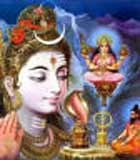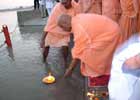The river Ganga is venerated by the Hindus as a mother as well as a goddess.
In the Ganga Dussehra festival ten days are devoted to the worship of
the river Ganga. This festival is celebrated on the tenth day of
Jyeshtha. People from all parts of India come to the bathing ghats
along the Ganges to take a holy dip in the river.
According to the Agni Purana and Padma Purana, Gangavataran or
the Ganga descended to the earth on Ganga Dussehra day and a bath in
the holy river on this day is said to purify one of all sins. To die
on the banks of the Ganga is considered most auspicious. If that is
not possible, then the immersion of the ashes after cremation in the
river Ganga is a must, as it then releases one from the cycles of
birth and re-birth. People believe that bathing in the Ganges on the
occasion will help them attain salvation and will liberate them from
the wheel of birth and death. Devotees touch the river water, bathe in
it and take the river clay home to venerate.
In Haridwar, aartis are performed at twilight
and devotees meditate on the river banks. Ganga jal (water) is kept in
sealed pots in homes by the devotees and is used on sacred days in
sanctifying places. People, who cannot reach Ganga banks on this day,
bathe in some nearby tank or river invoking Ganga by chanting her name
and offering prayers to her.
Festivals and Fairs |
   |


